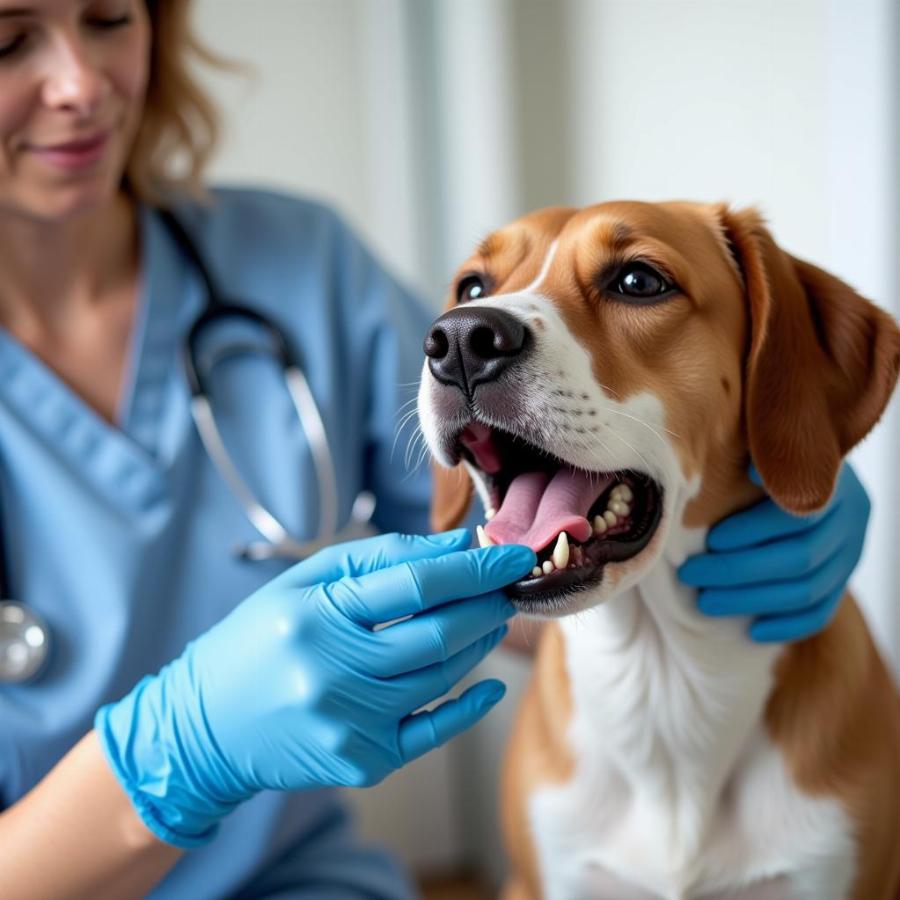Has your furry friend developed a case of the gulps? If your dog keeps swallowing repeatedly, it can be concerning. While occasional swallowing is normal, frequent swallowing can be a sign of various issues, ranging from mild to serious. This article delves into the potential reasons behind your dog’s excessive swallowing, helping you understand when it’s time to seek veterinary attention.
Common Causes of Excessive Swallowing in Dogs
Let’s explore some common culprits behind your dog’s swallowing habits:
Nausea
Just like us, dogs experience nausea. Excessive drooling often accompanies swallowing when a dog feels nauseous.
What to do: If you suspect nausea, look for other signs like lip licking, lethargy, or a hunched posture. It’s best to contact your vet, as nausea can be a symptom of various conditions.
Dehydration
When a dog is dehydrated, their mouth becomes dry, prompting more frequent swallowing.
What to do: Always ensure your dog has access to fresh, clean water. If dehydration is suspected, offer small amounts of water frequently. If the problem persists or is severe, consult your vet.
Dental Issues
A sore tooth, inflamed gums, or other oral discomfort can lead to excessive swallowing.
What to do: Regularly examine your dog’s mouth for any abnormalities like redness, swelling, or broken teeth. Schedule a dental checkup with your vet if you notice any issues.
 Dog dental checkup
Dog dental checkup
Foreign Objects
Dogs are notorious for exploring the world with their mouths, sometimes ingesting things they shouldn’t. A lodged foreign object can cause difficulty swallowing and increased attempts to dislodge it.
What to do: If you suspect your dog has swallowed something it shouldn’t have, contact your veterinarian immediately. This situation can be life-threatening and requires prompt professional attention.
Gastrointestinal Upset
Just like us, dogs experience digestive discomfort. Gastritis, acid reflux, or other gastrointestinal issues can lead to increased swallowing.
What to do: If you notice other symptoms like vomiting, diarrhea, or loss of appetite alongside excessive swallowing, contact your vet to determine the cause of the upset.
Anxiety or Stress
Believe it or not, emotional factors can also play a role. Anxious or stressed dogs may swallow more frequently.
What to do: If your dog’s excessive swallowing seems related to anxiety or stress, try to identify and minimize the triggers. Provide a calm and safe environment for your furry friend. If the behavior persists, consult a veterinarian or a certified dog behaviorist.
Neurological Problems
In some cases, neurological conditions can affect a dog’s ability to swallow properly.
What to do: If you observe other neurological symptoms like head tilting, incoordination, or seizures alongside excessive swallowing, seek immediate veterinary care.
When to Worry
While occasional swallowing is normal, pay close attention if:
- Swallowing becomes constant or excessive.
- Your dog seems distressed or in pain.
- You notice other symptoms like coughing, gagging, drooling, vomiting, diarrhea, lethargy, or loss of appetite.
- You suspect your dog has ingested a foreign object.
Tips for a Healthy Swallow
- Provide fresh water at all times.
- Schedule regular veterinary checkups, including dental exams.
- Practice safe toy management and prevent access to potential choking hazards.
- Feed a balanced and appropriate diet.
- Monitor your dog’s behavior for any changes.
Expert Insights
“Many pet parents don’t realize the importance of regular dental care for their dogs,” says Dr. Emily Parker, a veterinarian with over 15 years of experience. “Dental issues can cause discomfort and lead to problems like excessive swallowing. Regular brushing and dental cleanings can go a long way in preventing these issues.”
Conclusion
Excessive swallowing in dogs can be a signal of various underlying issues, some minor and some potentially serious. Paying close attention to your dog’s behavior and seeking timely veterinary advice are crucial in ensuring their well-being.
If your dog’s swallowing habits concern you, don’t hesitate to contact your veterinarian. Early detection and treatment are essential for a positive outcome.
FAQs
Q: My dog swallows a lot after eating. Is that normal?
A: It’s normal for dogs to swallow a few times after eating or drinking. However, excessive or continuous swallowing after meals could indicate a problem.
Q: Can certain medications cause excessive swallowing in dogs?
A: Yes, some medications can have side effects that include increased salivation or dry mouth, both of which can lead to more frequent swallowing.
Q: My dog keeps swallowing and licking their lips. What does it mean?
A: This combination often suggests nausea. It’s best to contact your vet to determine the cause.
Q: Can heatstroke cause excessive swallowing in dogs?
A: Yes, heatstroke is a serious condition that can lead to dehydration and excessive panting and swallowing. Seek immediate veterinary attention if you suspect heatstroke.
Looking for More Information?
Check out these related articles on Beaut Dogs:
- Dog Dental Care: A Comprehensive Guide
- Understanding Your Dog’s Body Language
- Common Canine Digestive Problems
Beaut Dogs is your trusted source for all things dog-related. We are committed to providing valuable and insightful information to help you provide the best possible care for your furry companions. For any further assistance or inquiries, reach out to us at [email protected]. Let Beaut Dogs be your partner in responsible dog ownership!